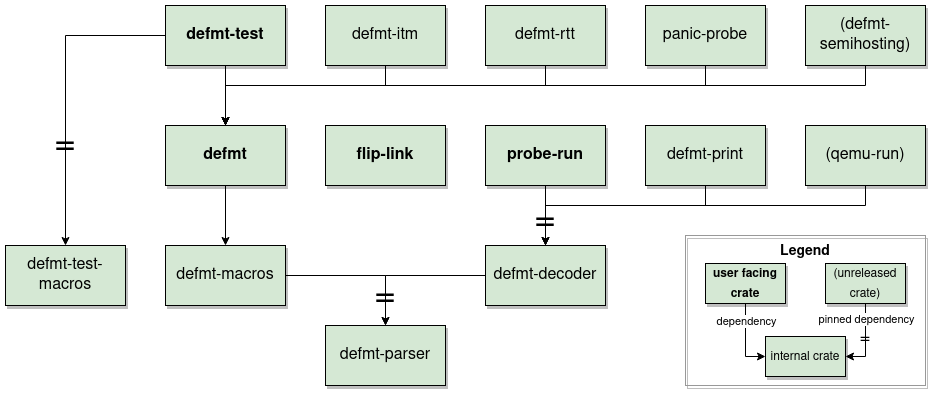defmt ("de format", short for "deferred formatting") is a highly efficient logging framework that targets resource-constrained devices, like microcontrollers.
For more details about the framework check the book at https://defmt.ferrous-systems.com.
The git version of the defmt book can be viewed at https://defmt-next.ferrous-systems.com/.
The fastest way to get started with defmt is to use our app-template to set up a new Cortex-M embedded project.
To include defmt in your existing project, follow our Application Setup guide.
defmt always compiles on the latest stable rust release. This is enforced by our CI building and testing against this version.
It still might work on older rust versions, but this isn't ensured.
The following diagram illustrates the user-facing and internal crates of the defmt framework.
Tests are run using cargo xtask -- although this is simply an alias (defined in .cargo/config.toml) for cargo run --package xtask --.
To see a list of options, see xtask/src/main.rs, or run:
$ cargo xtask helpFor example, to run all the tests, run:
$ cargo xtask test-allYou will need qemu-system-arm installed and in your $PATH for some of the tests (e.g. test-snapshot).
defmt is part of the Knurling project, Ferrous Systems' effort at
improving tooling used to develop for embedded systems.
If you think that our work is useful, consider sponsoring it via GitHub Sponsors.
Licensed under either of
-
Apache License, Version 2.0 (LICENSE-APACHE or https://www.apache.org/licenses/LICENSE-2.0)
-
MIT license (LICENSE-MIT or https://opensource.org/licenses/MIT)
at your option.
Unless you explicitly state otherwise, any contribution intentionally submitted for inclusion in the work by you, as defined in the Apache-2.0 license, shall be licensed as above, without any additional terms or conditions.
